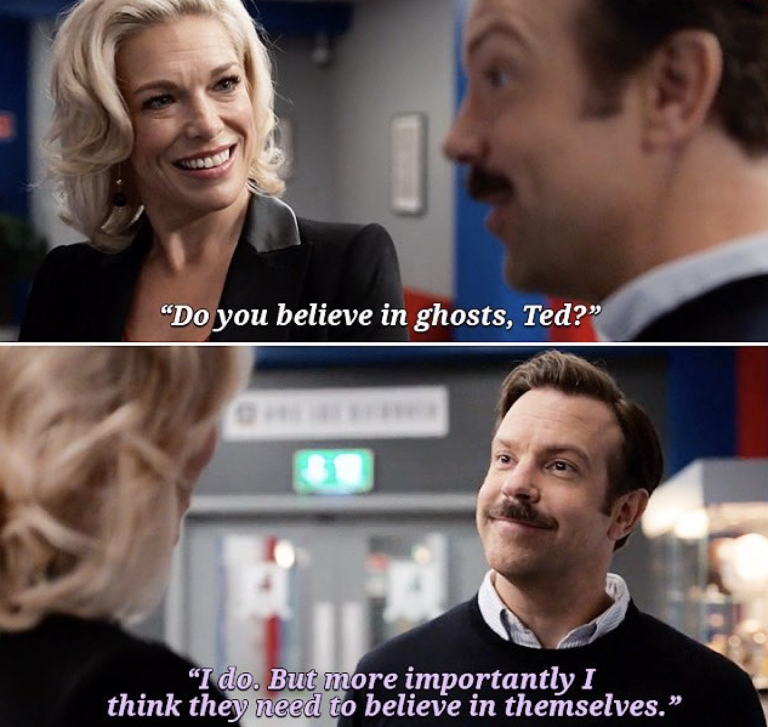Recently, I have been immersing myself in the wisdom of Ted Lasso, an American sports comedy-drama. Ted Lasso is about an American football coach who has been hired to coach a British soccer team. Like a fish out of water – he must draw on universal strengths and qualities to overcome the culture and sports barrier. Ted has no idea about soccer rules, but he knows that leading a team is not about that. It is about emotional intelligence.

Ted Lasso looks for the good in everyone he meets. That’s not because his life is perfect but because of deep-seated beliefs in the goodness of people. Some people would call him naive, but as the show progresses, his faith helps him unlock the best qualities in people. Frankly enough, our best traits are often hiding deep inside underneath our fears, traumas and insecurities.
Some of you are shaking your heads now, thinking to yourself, “I have been there, I believed in someone, and they disappointed me”. And yes, sometimes people disappoint us, but we forget that we all are complex human beings.
In the show, many of the villains gradually reveal why they are the way they are. They become less villainous under Ted’s influence and more humans we can all relate to and understand. His emotional intelligence guides him to find the most compelling entries into people’s thoughts and minds. He uses subtle tactics and tough love.
Ted Lasso shows us that characters have nuances and layers that have depth and complexity in a world that often can be all about white and black portraits.
If we want to become good leaders, we need to stop seeing people as good or bad, competent or incompetent. We need to start seeing them as multilayer beings who possess more than what is evident above the surface, and it is our role to help them see that too.
We have a chance to unlock their full potential if we use emotional intelligence.
Do you ever wonder how your life would look if you never questioned whether you are capable, skilled or smart enough? You would be living without fears, growing, exploring every day, just because you know you are capable. This would be our ideal scenario, wouldn’t it? But sometimes, we struggle and need a little bit of Ted Lasso in our lives to help us get there.
I invite you to be that person for your team. Someone who believes in them, even if they struggle to believe in themselves. A true leader knows when to stand and inspire and when to walk away. A good leader is always there, observing and learning about their people. Watching them succeed and fail but not giving up. And once the people feel that trust and encouragement, they start unlocking what’s underneath the layers of long built self-protection.
We can all apply more emotional intelligence into our leadership like Ted Lasso if we strive to:
- Be vulnerable. Your team wants to see you as a human being just like them. Be honest when times are hard and give them a chance to relate to you. As the season progresses, without giving anything away, you will see a very human side of Ted that will endear him to you even more.
- Be self-aware. Self-awareness helps us understand why we act the way we do, what triggers us, and what relaxes us. Once you know your triggers, you can also recognize that in other people. Interestingly, Ted’s self-awareness continues to grow during the series, adding new layers of plot development.
- Be motivated. Motivation can be infectious. Instead of asking your team to feel motivated, show them the example. Your drive will inspire them. Ted’s enthusiasm and encouragement are contagious, even to those of us watching the show.
- Be empathetic. Understanding the feelings and thoughts of your employees will make them feel supported. One of my favorite aspects of character development is that Ted realizes what makes people tick in a highly empathetic manner from the beginning.
- Be effective in your communication. Effective communication helps eliminate misunderstandings, improve the relationship within a team, and learn more about each other. Putting the word BELIEVE in bold letters over his office door is as clear as you can make it!
Ted does not worry about short term losses; he focuses on a long term vision. He is aware that if he helps his team to discover the best qualities that have been hidden, it is a long term success. And this is what all leaders should focus on, the long term vision. Spend time to know your people, understand where they are coming from, understand their insecurities, pain and fears, and be the spark they need to overcome them. The results will surprise you.
Interested in becoming a better leader? Enroll in our Transformational Leadership Program!

